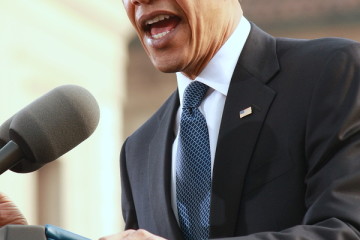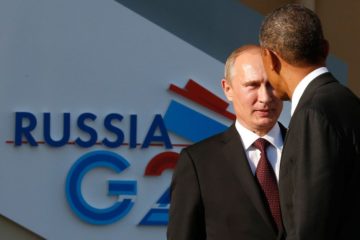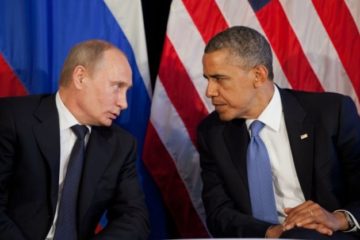Israel Fears Obama Won’t Protect Its Nuclear ‘Secret’: Eli Lake

©2015 Bloomberg View
NOOHID6S9729
(Bloomberg View) — The Israeli government is worried the Obama administration will allow a U.N. conference this week to adopt a resolution that could compel Israel to acknowledge its nuclear arsenal.
At issue is a proposal at the Nuclear Nonproliferation Treaty Review Conference that would empower the U.N. secretary general to organize a conference to pursue a Middle East free of nukes and other weapons of mass destruction.
Israel is one of three nuclear states (along with Pakistan and India) that have not signed the treaty. But unlike Pakistan and India, Israel has never formally acknowledged that it has nuclear weapons.
Egypt and other Arab states have pressed for a nuclear-free Middle East zone at this conference since the 1990s. In 2010, for the first time, the conference adopted language that laid out the first steps for achieving this zone. But to move forward and hold a conference on keeping nukes out of the Middle East, the group needed consensus support from the United States, Russia and Britain, three of five countries that the treaty acknowledges to have nukes. There was no consensus.
But this time it’s different. The Spanish delegation this year proposes letting the U.N. secretary general convene a conference on a nuclear-free Middle East, even without consensus support. In essence, it would mean that Israel’s most important ally, the United States, would not be able to block the convention.
A senior Israeli government official Wednesday evening told me, “Israel is increasingly concerned that the United States is not going to prevent the NPT review conference currently meeting in New York from adopting a resolution on the Middle East that would jeopardize Israel’s national security.”
Bernadette Meehan, a spokeswoman for the National Security Council, disputed this. She told me there was no final text on the Middle East conference, “but we are working to ensure that it meets our interests and those of Israel.”
She added: “Both the United States and Israel support the creation of a WMD-free zone in the Middle East. We are working closely with our Israeli partners to advance our mutual interests, including preserving the NPT.”
The resolution that Israel fears would likely lead to a conference that would formally disclose one of the Middle East’s worst-kept secrets: Israeli nuclear weapons. Henry Sokolski, the executive director of the Nonproliferation Policy Education Center, told me, “The conference wouldn’t immediately lead to the disarmament of Israel, but it would immediately require a discussion and admission of the existence of these weapons.”
The senior Israeli official, who spoke on the condition of anonymity because he was discussing sensitive diplomatic issues, said of the Spanish proposal, “The adoption of such a resolution would contradict a U.S. commitment made to Israel as publicly stated in 2010 by President Obama and then National Security Adviser James Jones.”
Meehan said this was not happening. “This administration and this president do not break commitments to our Israeli partners, and any suggestion to the contrary is offensive,” she said.
Obama after the 2010 treaty review conference said the U.S. supported the Middle East zone free of weapons of mass destruction. But he added: “Our view is that a comprehensive and durable peace in the region and full compliance by all regional states with their arms control and nonproliferation obligations are essential precursors for its establishment.” Obama also said, “We strongly oppose efforts to single out Israel, and will oppose actions that jeopardize Israel’s national security.”
Obama was reiterating a long-standing secret understanding on Israel’s nuclear arsenal, dating back to 1969. That year during a meeting between President Richard Nixon and Prime Minister Golda Meir, Israel committed to not testing a nuclear weapon and the United States committed to protect Israel from efforts to force it to sign the nonproliferation treaty or give up nuclear weapons.
But much has changed since 1969 and since 2010. The Obama administration is trying to close a deal aimed at preventing Iran from building a nuclear weapon. Iran’s foreign minister last month at the treaty review conference slammed Israel as a threat to the region because of its nuclear arsenal.
President Obama’s relationship with Israel’s prime minister, Benjamin Netanyahu, has also become strained. Following Netanyahu’s election, Obama said he would be reviewing the U.S. relationship with Israel. Other U.S. officials at the time said that would include rethinking the longstanding U.S. policy to veto U.N. resolutions that singled out the Jewish state.
But Israel too has changed on this issue. While it’s still official Israeli policy not to acknowledge its nuclear arsenal, Israeli authors and journalists have had a freer hand to write about the issue than in the past, when military censors stopped most public discussion of Israel’s nuclear arsenal. Ari Shavit, one of the country’s leading journalists, published a detailed chapter in his 2013 book, “My Promised Land,” on the history of Israel’s nuclear program at Dimona.
At issue now is whether Israel’s policy of not acknowledging the nuclear weapons can survive. In some ways, it creates a paradox. Sokolski described that paradox: “The supposition is that Israel’s security depends on them being able to have the ability to threaten the use of nuclear weapons without having to admit that they have them.”
To contact the author on this story: Eli Lake at elake1@bloomberg.net To contact the editor on this story: Philip Gray at philipgray@bloomberg.net
For more columns from Bloomberg View, visit http://www.bloomberg.com/view







No Comment